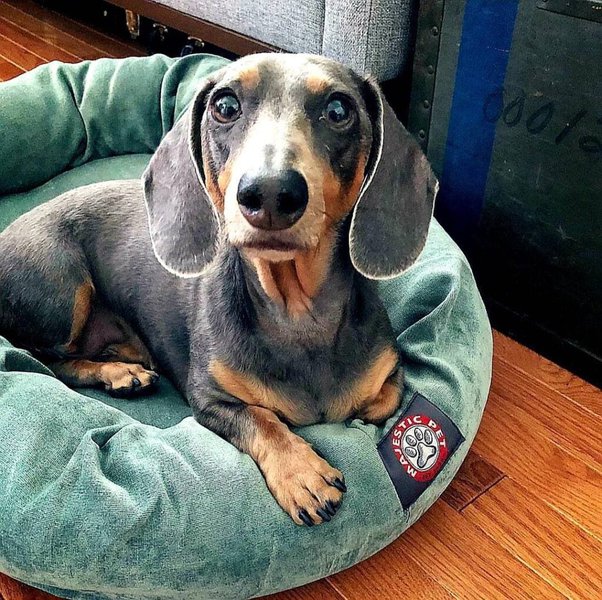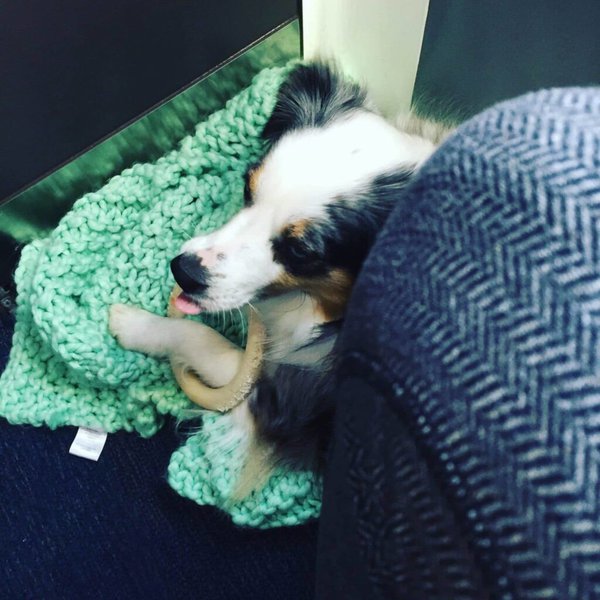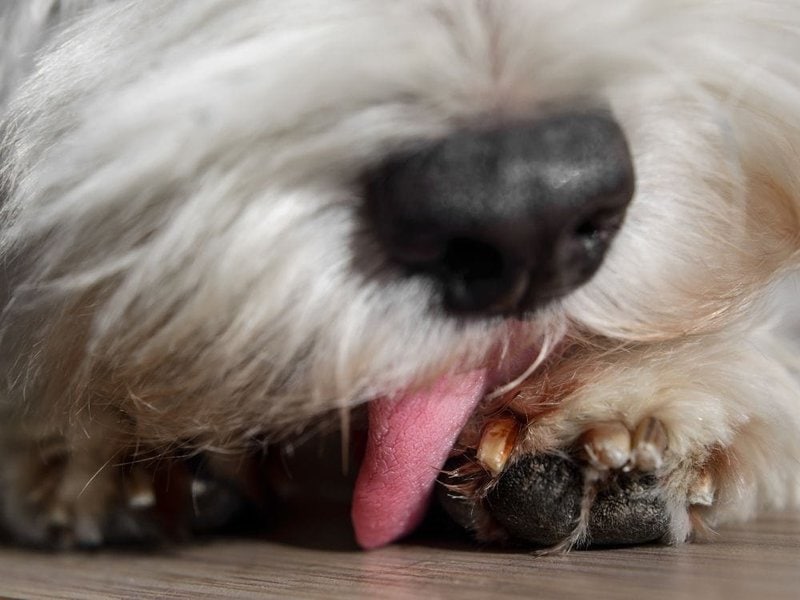Have you ever witnessed your dog engage in passionate paw licking? If so, you’ve probably wondered whether it’s a canine version of a mani-pedi or a sign that something’s off.
So why do dogs keep licking their paws? While an occasional session is normal, intense and constant paw licking is a sign of either medical or behavioral problems. From wounds to allergies, parasitic infections to separation anxiety, excessive paw licking is a warning sign that should not be ignored.
Before we find out what we can do to alleviate the discomfort in our dog’s paws, let’s take a closer look at possible reasons behind paw-licking and how to tell if it’s something to be worried about.
Why Is My Dog Licking His Paws Like Crazy?
Dogs are funny creatures who sometimes do things that we don’t understand, and one of these is paw licking. Our fur buddies engage in this activity for three general reasons. As fur parents we should be able to tell which is which.
Grooming
You might think dogs just love to get dirty, but paw licking is one indication that they find cleanliness somewhat important.
Dogs often do this after coming back in from a walk, after eating, or before settling in for a nap. Once they’ve gotten rid of whatever debris is between their toes, they go about their day with nary a glance downward.
Infection And Inflammation
If your dog is constantly licking and biting their paws or front legs for more than a few minutes multiple times a day, your fur parent spidey senses should be tingling. Ditto if that area is red, swollen, and warm, or if your dog becomes aggressive or fearful when you try to touch it.
In vet lingo, these are all signs of pododermatitis or “inflammation of the paw”. Given that the paw is constantly exposed to wear, friction, pressure and pathogens on ground, it’s easy to see why this condition is a symptom for multiple diseases.
Your dog might have stepped on chemical irritants, or been exposed to sun-heated pavements and ice-cold streets.
There might be foreign objects lodged in between your pooch’s toes, bacteria or fungi colonizing in the moist crevices of the paw, or microscopic parasites for whom dog paws are prime real estate on which to build their homes.
While this list is by no means exhaustive, these are the most common culprits behind canine pododermatitis.
Anxiety And Boredom
There are dogs for whom paw licking is a compulsive activity. They may do this to reduce their anxiety, manage their stress, or expend excess energy.

Is It Bad If Dogs Lick Their Paws?
Given these reasons, you might wonder if it is safe for dogs to be licking their paws at all. If the ground is home to all kinds of harmful things, then is it a good idea to allow dogs to put their dirty paws into their mouths?
Safety Of Paw Licking
It’s normal for dogs to lick themselves, so it is not inherently dangerous for them to do. In healthy animals, the digestive system puts up a good fight against pathogens and irritants.
The acidity of the stomach, the antibody-rich intestinal fluid, and the natural microflora of the gut are just some of the ways the body protects itself from ingested dangers.
Likewise, vomiting and pooping are behaviors that help get rid of unwanted visitors.
Function Of Paw Licking
The feet are the most beat-up part of an animal’s body as it bears their weight and is constantly in contact with the ground surface.
While the paw pads are especially thick and rubbery, these can get dirty, cracked and dry with constant wear-and-tear. This compromises the protective function of the paw pads, making them prone to injury and infection.
Paw licking is one way that our furry buddies clean and soothe their paws. This appears to be relaxing for them, so much so that some dogs do this compulsively when they are feeling stressed and anxious.
Paw licking may also be a sign of pain in dogs, as the activity indicates that something about their feet is bothering them.
Dangers Of Excessive Paw Licking
Paw licking only becomes a problem when it is done often and too intensely.
Their rough tongues further ground the skin down and their saliva creates an ideal breeding ground for pathogens. This is the opposite of helpful, particularly when the feet are already cracked and damaged to begin with.

What Should I Do If My Dog Keeps Licking His Paws?
If you notice your dog has been a little too enthusiastic about paw licking, the first step is to find out why. Remember that this is a manifestation of several medical conditions that have very different treatment strategies, so playing a guessing game might prolong your pooch’s discomfort.
Getting a definitive diagnosis is the first step to stop your dog’s paws from itching, and that means taking a trip to the vet!
What To Expect At The Vet
Your vet will ask you questions about your pooch to find out if your dog has been exposed to factors linked to paw licking. To help them out, think back on any special events that precipitated the behavior.
Then your vet will examine your dog’s paws visually and via palpation. They will check all four paws, regardless of which among those is the reason for the visit.
Laboratory tests are often necessary if the suspected cause is an infection. There are ways to determine if it’s bacterial, fungal, or parasitic in nature. More complex tests are needed for allergies, autoimmune diseases, hormone imbalances, and others.
Treatment
The treatment is based on the diagnosis.
If the problem is bacterial in nature, the vet will instruct you how to treat your dog’s infected paws at home with oral or topical antibiotics.
If the problem is a foreign body or a wound, your vet will advise you what to spray on your dog’s paws to stop licking and keep it clean.
If the problem is contact with an allergen, the vet may prescribe a special diet and close observation to see if it improves. And the list goes on.
Paw licking must be avoided to allow the area to heal.
Elizabethan collars, bandages, and anti-itch medications may be used. On top of that, limiting exercise is often advised.

Can You Put Anything On Dogs Paws?
Remember that the primary function of paw licking is to clean and soothe the paws. So if your pooch’s paws are dirt-free, supple, and moisturized to begin with, then they won’t need to lick their paws.
You can wash your dog’s paws with doggy soap and water after a walk to remove dirt from their feet. Once clean, dry them thoroughly. Then rub their paws with a protective coating. Here are some popular pooch-friendly options:
Paw Balm
Paw balms are formulated with dog-safe ingredients that have soothing and moisturizing properties.
The best paw balm for dogs is the one they don’t mind having on. It’s a matter of preference, so you might need to try a few brands before finding The One.
Since it’s non-toxic, you can apply paw balm as often as you like.
We recommend taking a look at Baely’s Paw Shield Platinum. Made in the US and of a beeswax blend formula, it gives your pooch’s paws a moist and nutrient-rich environment conducive to healing and a speedier recovery.
Vaseline
You can put vaseline on your dog’s paws to keep them moisturized and supple. This household staple contains petroleum jelly, a highly effective emollient that traps transepidermal water under a thick, oily layer. Remember that you don’t need to slather it on–a little goes a long way!
Apple Cider Vinegar
You can apply apple cider vinegar on your dog’s paws, but only if it’s diluted in the same amount of water. This keeps the highly acidic vinegar from messing with the natural pH of your dog’s skin. If you’re wondering what apple cider vinegar solution does for dogs, know that it serves as a mild disinfectant and anti-fungal.
When used in its diluted form, you can spray your dog with apple cider vinegar as often as every other day. Note, however, that this should not be used on open wounds as it can be painful.
Coconut Oil
You can put coconut oil on your dog’s paws as a moisturizer, anti-bacterial, anti-fungal, and anti-inflammatory. It gets all these superpowers because of its high concentration of lauric acid. Since it is an oil, it is a good emollient, plus it smells great!
We recommend Zesty Paws Coconut Oil For Dogs, an oil-based supplement made from certified organic coconuts and beneficial fatty acids of Omega 6 and 9. When administered dermally, it nourishes and helps retain moisture on your pooch’s paws for rapid healing.
Related Questions
What Does It Mean When A Dog Licks Your Feet? Licking a human’s feet is one way dogs show their affection and submission. It’s a rather odd way of saying they love you, but pooches are funny creatures. On the other hand, licking allows dogs to explore their world. Your feet may have a pungent smell that they want to taste.
Why Do Dogs Lick Their Paws Before Going To Sleep? Like humans, dogs want to be comfortable when they go to bed. Having debris and dirt stuck between their toes is not conducive to rest, so they remove it by licking their toes. Additionally, this activity is soothing and relaxing to our furry buddies.
How Do I Make My Dog Stop Licking Everything? Licking is a means to learn more about the environment, so you should not stop or punish your dog for doing what comes naturally. However, there are times when that thing they want to lick is potentially dangerous. Training them to stop what they’re doing and go to your side is one way to prevent this.





